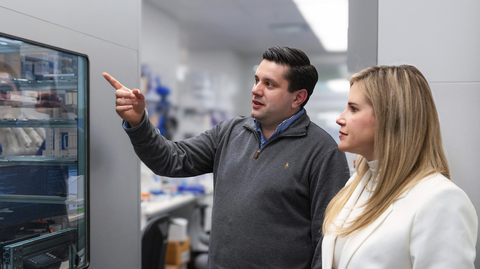Vivodyne, a biotech that discovers and develops more effective drugs by testing them on lab-grown human organs, today announced the close of $38 million in total seed financing, led by Khosla Ventures, with participation from Kairos Ventures, CS Ventures, MBX Capital, and Bison Ventures.
This press release features multimedia. View the full release here: https://www.businesswire.com/news/home/20231122325161/en/

Susan Billings (right), Vivodyne’s Chief Commercial Officer, and Andrei Georgescu stand in Vivodyne’s Philadelphia laboratory, where the company accelerates the development of cures to human diseases by using their robotic platforms (left) to grow and test on human organ tissues at large scale. Photo credit: Thomas Cantrell
The funding will advance Vivodyne’s discovery pipeline and clinically predictive AI stack, which identifies novel therapeutic targets and predicts patient responses to new drugs by testing directly on lab-grown human organ tissues. Vivodyne has bioengineered over 20 types of human organ tissues that mimic native human physiology and function to accurately capture the effects of new therapies and predict patient outcomes at the cellular, tissue, organ, and systemic scale.
One of the main bottlenecks in drug development is the inability to gather human-predictive data that is realistic, scalable, and reproducible. Vivodyne’s transformative approach for drug discovery produces patient-level human results before a drug is ever tested in clinical trials. The company’s platform can cultivate, dose, and analyze more than 10,000 individual human tissues at a time using robotic automation, allowing the production of vast human datasets that will power the next generation of human-trained AI for drug discovery.
Importantly, their platform’s ability to create human data overcomes the key obstacle of AI-driven drug discovery: the unavailability of large, high-quality human datasets for AI training, and the overreliance on simple cell culture to fill this void.
“We’re thrilled to have Khosla Ventures lead this funding round, which accelerates the development of our AI platform that enables the generation of predictive human data before therapeutics enter clinical trials,” said Andrei Georgescu, CEO and Co-Founder of Vivodyne. “By combining the principles of organoids and organs-on-chips, we’ve created a new class of lifelike, lab-grown human organs. We use these lab-grown human test subjects to discover and develop new therapies for human diseases. The result is huge amounts of complex human data—larger than you could get from any clinical trial—and we train multimodal models on this data to predict and improve the safety and efficacy of new drugs. This breakthrough not only enhances the predictive accuracy of AI in drug development, but also promises to significantly improve the success rates of AI-generated drugs, setting a new standard in the field.”
“By testing drugs and life-saving biologics directly on these realistic human tissues at an unprecedented scale and resolution, we can improve the success rates of therapeutics entering clinical trials,” said Alex Morgan, Partner at Khosla Ventures. “Vivodyne’s technology bridges the gap between preclinical R&D and human clinical trials, while automating every step of the testing pipeline, from growing tissues, dosing, sampling and imaging, to analyzing data. The ability to screen and develop new potential lifesaving therapies, testing thousands at a time on functionally realistic human tissues on Vivodyne’s automated platform, is a major step forward for the pharmaceutical industry.”
“The next frontier of therapeutics development rests on achieving greater preclinical certainty before drugs enter clinical trials. Biopharma companies face a pivotal challenge when years of research and significant financial investment confront the unpredictability of clinical trial outcomes and it doesn’t have to be a nailbiter in the eleventh hour waiting for those results. This is biotech’s biggest challenge and our critical focus,” said Susan Billings, Chief Commercial Officer, Vivodyne. “Our platform enables the collection of invaluable human data from early discovery to post-approval — faster, at larger scale, with far more human predictability than animal studies. By producing human data from the outset, we’re identifying and validating novel targets, and significantly mitigating risk prior to clinical trials. For approved therapies, we’re expanding their impact through the discovery of new indications and enhancing patient care.”
“What truly sets Vivodyne apart is the seamless integration of life-like, functional lab-grown human tissues, best-in-class robotics, and a strong AI stack — which comes together with the singular focus of generating vast volumes of predictive, preclinical human data,” said Alex Andrianopoulos, Chief R&D Officer at Kairos Ventures. “The most important aspect is how these pieces all converge to produce huge quantities of predictive, preclinical human data that Vivodyne’s AI pipelines can harness to create better and safer drugs more quickly.”
Vivodyne has used its AI platform to design and improve many modalities of drugs, from small molecules, to biologics including antibodies and antibody-drug conjugates, to mRNA-bearing lipid nanoparticles, and cell therapies. The company currently has collaborations with the majority of the top 10 large pharma companies, and the Co-Founders’ work has been published in Science, Nature Methods, Nature Medicine, and countless other high-impact publications leading up to Vivodyne’s formation.
About Vivodyne
Vivodyne is a biotechnology company that accelerates the development of more effective medicines by testing on thousands of lifelike, lab-grown human organ tissues at a time. Robots are used to grow and experiment on lab-grown human organs at massive scale, creating datasets of unparalleled realism and breadth to power a predictive AI platform technology. Vivodyne was founded by University of Pennsylvania bioengineers Andrei Georgescu and Dan Huh. For more information, visit https://vivodyne.com. Follow us @vivodyne.
View source version on businesswire.com: https://www.businesswire.com/news/home/20231122325161/en/